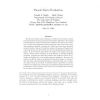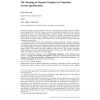317 search results - page 53 / 64 » Deductive Program Repair |
117
click to vote
COGSCI
2004
15 years 2 months ago
2004
Disfluencies include editing terms such as uh and um as well as repeats and revisions. Little is known about how disfluencies are processed, and there has been next to no research...
112
click to vote
SIGUCCS
2006
ACM
15 years 8 months ago
2006
ACM
In recent years, the use of a computer has become a requirement for success in a collegiate environment, and the demand for mobile computing has sharply increased. In response to ...
118
click to vote
ADC
1999
Springer
15 years 6 months ago
1999
Springer
We introduce pseudo-naive evaluation, a method for execution of mixed top-down/bottom-up logic programs and deductive databases. The method is intermediate in power between naive ...
103
Voted
LPNMR
1990
Springer
15 years 6 months ago
1990
Springer
We present a general theory for the use of negative premises in the rules of Transition System Specifications (TSSs). We formulate a criterion that should be satisfied by a TSS in ...
195
Voted
POPL
2011
ACM
14 years 5 months ago
2011
ACM
We define a new logic, STRAND, that allows reasoning with heapmanipulating programs using deductive verification and SMT solvers. STRAND logic (“STRucture ANd Data” logic) f...


